In 2014 Pew Research did a survey about the way different religious groups within the US feel about each other. Within religious groups, there was also analysis by political affiliation. I wrote about it at the time, lamenting the low opinion most USIans have of atheists. I found that especially frustrating as studies show that atheists are actually statistically more likely to be good citizens (see data below).
2014 Pew Research Center Survey
Below is the result of the survey about the feelings of different religious groups towards others from 2014. Pew wrote at the time:
Religious groups are rated more positively by their own members than by people from other religious backgrounds. Catholics as a group, for example, receive an average thermometer rating of 80 from Americans who describe themselves as Catholic, compared with 58 from non-Catholics. Similarly, evangelical Christians receive an average rating of 79 from people who describe themselves as born-again or evangelical Christians, compared with an average rating of 52 from non-evangelicals. Among non-evangelicals, roughly as many people give evangelicals a cold rating (27%) as give them a warm rating (30%).
(Click graph to go to source.)
New Analysis from the Pew Research Center
This survey was recently re-done and the good news is atheists are now more popular on average. That’s largely because younger people see us positively – older USians still hate us.
There has been a growth in the number of atheists and secular people, especially amongst younger USians, and this is likely the reason they have a more positive view. (As noted above, people are more likely to view their own group more positively.)
Muslims, who were the only other group in 2014 who did as badly as atheists, are also doing better. They still get poor results with certain demographics, especially the same group that hates atheists the most.
And which group is that? If you said older, white, evangelical Protestant Republicans, you were right.
The other interesting thing is that every religious group except one now has a better level of perception than before. The one group whose perception level has not improved is evangelical Christians.
Of course, this is also the group where President Trump finds his most devoted followers.
We atheists are especially doing better amongst Democrats. In 2014, atheists (46%) were second last with Democrats – only Mormons (44%) were lower on the feelings thermometer. The low ranking of Mormons then may have been due to Mormonism being the religion of the most recent Republican candidate of the time. Now atheists (57%) are ahead of not only Mormons (52%), but Muslims (56%) and Evangelical Christians (53%) as well. We may be beating out the Evangelical Christians amongst Democrats because of their devotion to President Trump.
Atheists at 34% were also second last with Republicans in 2014, barely beating Muslims (33%) for the lowest place. Three years later, our rankings remain the same, but the gap is now slightly bigger. Muslims are at 39% and atheists are 43%.
Most notably, the improvement rate in the perception of atheists is greater than that for any other group.
Variation Between Age Groups
There is a big difference in the perception of the groups between the different age ranges. Young people in particular seem not to see atheists as any different from anyone else, which is as it should be of course. People should be judged by their individual traits and not their religion, or lack thereof. Older USians though still, on average, have a strong prejudice against atheists.
In the youngest demographic, the range of results is only 12 points (54-66). It’s only 8 points if Mormons are left out. The 30-49 age group generally has more negative feelings overall, and a wider range of results at 17 points (47-64). The 50-64 year-old group has an even wider range of 24 points (45-69). A huge 31 point range (44-75) marks the 65+ age group.
There is something else that I notice about the two older age groups. Both have three distinct groups within their range. The top group, which both age ranges have positive positive feelings towards, are the Christians and Jews.
The middle group for both comprises Buddhists, Hindus, and Mormons. Buddhists and Hindus are not Christian religions. and many evangelicals and some other Christians do not consider Mormonism to be a Christian religion either.
Way below everyone else is atheists and Muslims, the worst of the worst. Neither group can even crack the 50% neutral mark with those who are 50 and older in the US.
I personally wonder (I don’t know and have no evidence either way) whether older USians are more likely to associate atheism with communism. It’s certainly a connection I hear from some when I watch Fox News. Those in the youngest age group can’t possibly even remember the feeling between the US and the USSR before 1980 – they weren’t even born!
Jeff Sessions May Prove My Hypothesis
I was watching the Jeff Sessions press conference this morning (10.00 am 3 March NZ time, 4.00 pm 2 March EST). The first question following his statement was what he discussed with the Russian ambassador. His response was that he couldn’t remember what they talked about EXCEPT a trip he took to Russia with a church group. Sessions then said that the ambassador responded that he wasn’t a believer himself.
It was sickening. In my opinion, Sessions was trying to make himself look good by associating himself with religion, and damning the ambassador by playing on the anti-atheist prejudice.
Everyone Still Likes Their Own Group Best
As in 2014, all groups still prefer their own. This is no surprise, and supports the argument I’ve always made that religion promotes an in-group/out-group mentality. This can’t possibly be good for society as a whole long-term though is perfectly understandable from an evolutionary point of view.
The biggest “hate” is that of atheists towards evangelical Christians. The average rating is only 29. Evangelical Christians don’t rate atheists much better – they give us only a 33 on average.
Personally, I think this antipathy is understandable. Atheists are subject to a great deal of vitriol from evangelical Christians. It’s not something that happens in New Zealand, but when I became active on-line towards the end of 2011 I was frankly shocked and stunned by the hatred directed at me by evangelical Christians just because I didn’t believe in their God. Unlike other Christians, they are also especially wedded to the creationist myth which creates a point of contention that isn’t there with many other religious. The high level of rejection of the theory of evolution in the US seems to be behind a great deal of the antipathy between atheists and evangelical Christians.
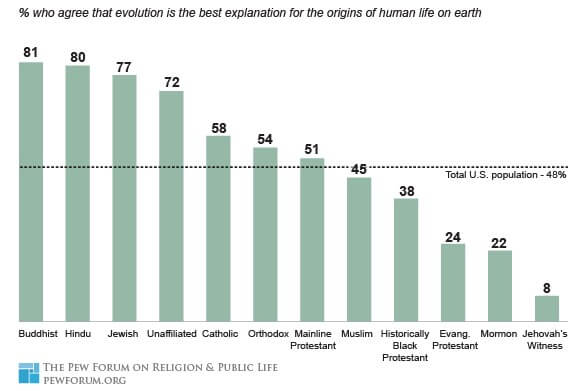
Pew Research Survey – February 2009
You’re More Likely to Have Positive Feelings Towards Another Group if You Know Someone in That Group
These next graph highlights an important fact – that once people get to know someone from an “out-group” they are less likely to have negative feelings towards all members of that group. This phenomenon has been seen most recently with the large numbers of LGBT people who feel able to be more open about their sexuality and society in general becoming more accepting as a result. We’ve even seen conservative US politicians supporting marriage equality once they find out the child they love is gay or lesbian.
This is also happening with atheists becoming more open about their lack of belief in the supernatural. There are more of us now, and people are realizing that we’re not so scary.
Everyone rates a group better if they know a member of that group. One of the biggest gaps is the rating of atheists.
The average rating of atheists for those who know an atheists is 59; the average rating for those who don’t know an atheist is only 38. The gap (21) was the same in 2014 – the average rating for atheists was 50 for those who knew one but was only 29 for those who didn’t.
Since 2014 atheists have become more visible, especially on-line. Now that people are getting to know us, we’re clearly not quite so scary. And, of course, more and more younger people are atheists and their parents are realizing they can still love their atheist child!

Phil Zuckerman
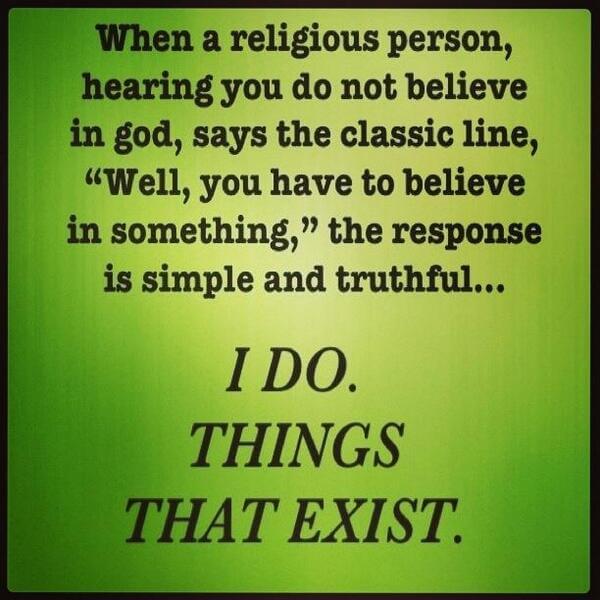 There’s a common belief amongst the religious that atheists don’t believe in anything and don’t have morals. Sociology professor Phil Zuckerman has been studying atheists for years. He recently founded the Department of Secular Studies at Pitzer University.
There’s a common belief amongst the religious that atheists don’t believe in anything and don’t have morals. Sociology professor Phil Zuckerman has been studying atheists for years. He recently founded the Department of Secular Studies at Pitzer University.
I quoted him in my recent post, ‘The Authoritarian Left and Misdirected Animosity in the Atheists Community‘. In 2009 he wrote, ‘Atheism, Secularity, and Well-Being: How the Findings of Social Science Counter Negative Stereotypes and Assumptions‘. The quote was:
… when we actually compare the values and beliefs of atheists and secular people to those of religious people, the former are markedly less nationalistic, less prejudiced, less anti-Semitic, less racist, less dogmatic, less ethnocentric, less close-minded, and less authoritarian.
He dealt with the accusation that atheists lack morals in the same paper:
… atheists and secular people actually possess a stronger or more ethical sense of social justice than their religious peers. After all, when it comes to such issues as the governmental use of torture or the death penalty, we see that atheists and secular people are far more merciful and humane. When it comes to protecting the environment, women’s rights, and gay rights, the non-religious again distinguish themselves as being the most supportive. And as stated earlier, atheists and secular people are also the least likely to harbor ethnocentric, racist, or nationalistic attitudes. Strange then, that so many people assume that atheists and non-religious people lack strong values or ethical beliefs – a truly groundless and unsupportable assumption.
Over the years, Zuckerman’s studies have consistently shown that atheists are, in general, the sort of people most would consider good friends, neighbours, and citizens. Maybe society is finally beginning to realize that fact.
If you enjoyed reading this, please consider donating a dollar or two to help keep the site going. Thank you.

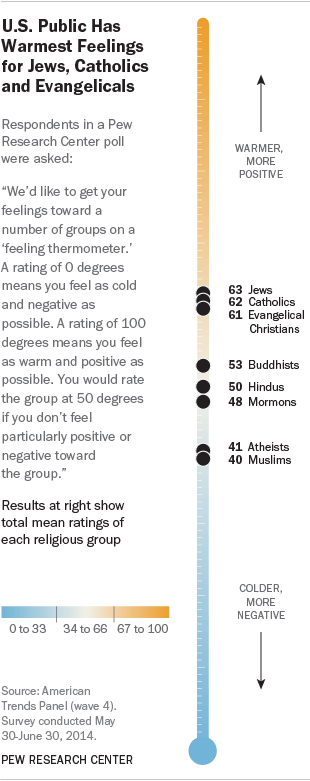
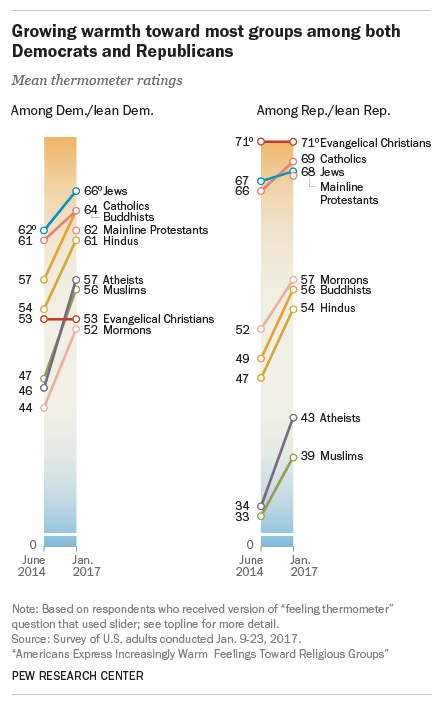
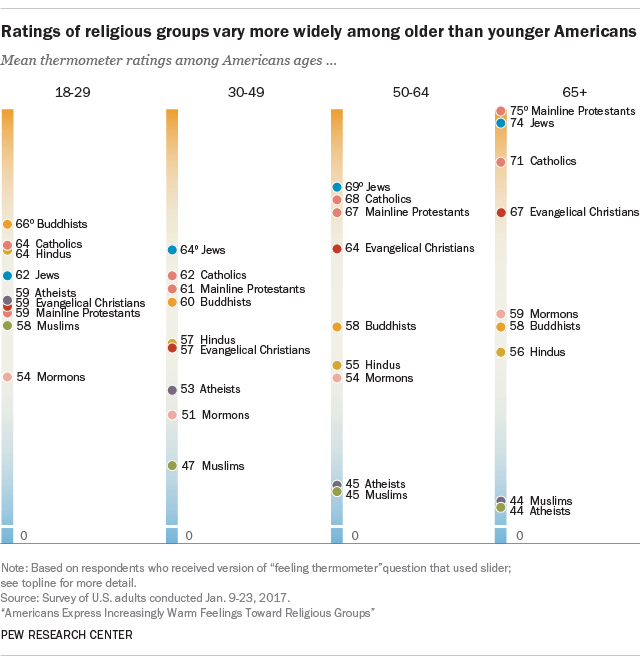
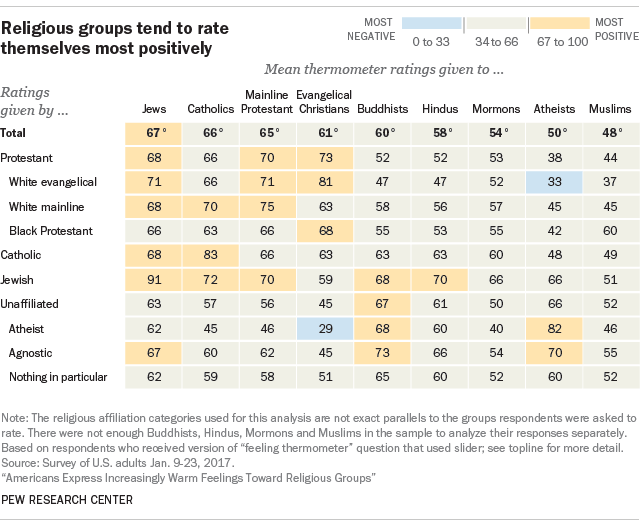
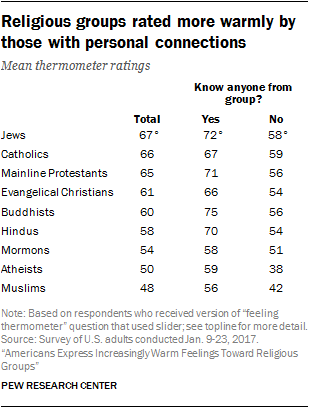
Good news, but still a long way to go.
Indeed, there is an association, rightly or wrongly so*, between atheism and communism.
VS Naipaul recounts in his “Among the Believers: an Islamic Journey” (IIRC) that he was advised not fill in ‘none’ in the ‘religion box’ on his visa requests, since that would be interpreted as’communist’, hence he filled in ‘protestant’.
[*most communists are indeed atheists, but most atheists are not communist.]
Interesting. I’ve heard that too about visiting Islamic countries, but I thought it was just the whole non-believer thing. Also, it’s actually illegal in Saudi Arabia to be an atheist.
Sorry to reply to myself, but I’m going to re-read “Among the Believers”. He wrote it in the early eighties, but it was/is kind of prescient.
His main thesis (IIRC) was the cognitive dissonance between the ideal of the perfect Islamic State, disgust & hatred of the’ West’ on the one hand and the reliance on that very same ‘West’ for anything, from medicine, education & science to industrial products & engineering, on the other. Fundamentalist Islam as a ‘parasitic’ ideology.
Are atheists a group? Many say no, an atheist simply is one who lacks membership in any group. She or he is a non-member of all groups. If atheists were a group, it would be a group defined solely by non-membership. (Such are the mental contortions, so it seems, that are required in order to place one’s faith in atheism.)
If the high rating that groups give themselves is due to the pernicious influence of religion, as stated above, then how do we explain the similarly high rating that the atheist “group” gives itself?
Atheists aren’t a group in my opinion, but they are a demographic. Experience has taught many atheists that they’re more likely to get on with another atheist than an evangelical Christian so they would likely rate atheists higher than evangelical Christians. Also, in the US atheists tend to have a bit of a feeling of siege mentality with everyone hating them, so I would expect them to rate other atheists much higher than I would if the survey was done in NZ. Personally, I would probably rate everyone at about 50% because there is not so much separation between any demographic grouping here. Being so small we basically have to get on with each other. All schools, workplaces, neighbourhoods etc have people from all walks of life.
I think one could indeed call ‘atheists’ a group (or a ‘demographic’, I’m not sure I understand fully what the latter is). However, they are a very diverse group, from regressive leftists to libertarians, environmentalists to global warming deniers, communists & fascists to Enlightenment democrats. And yes, there is one common denominator: they do not buy into the insanity religion is. Lest that sounds too negative: a majority of atheists tends to be pro-science, pro-democracy, pro-human rights, pro-environmental protection, pro-freedom of speech and to a greater or lesser degree ‘pro-choice’, I think (or should I say: I hope?).
[One could, of course, argue that e.g. communism is not really atheist: their Gods/prophets are Marx and Engels or the present Party Leader. Same goes for fascism: not nescessarily atheist].